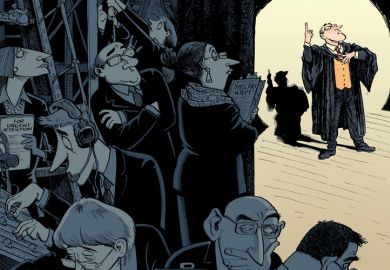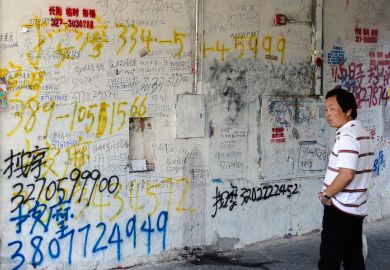I’m filling out a diary this week in which I’m supposed to account for my time. My university says that I must do this to comply with the UK's Higher Education Statistics Agency’s desire for information.
It’s part of financial sustainability and Trac (the Transparent Approach to Costing). How I love a good acronym in the morning.
This policy is routinely explained as a benign requirement to ensure continued funding. I shall leave to one side the point of establishing what I do each hour as a putative part of financial planning. Let’s take the authorities at their word on that bizarre notion. For the moment, at least.
I’m interested in what these developments mean as a professor.
I came to this country three years ago after two decades working at research-intensive schools in the US, both private and public. So I’m a senior neophyte.
Nothing like this was ever required of us. I doubt that it would have lasted, oh, five minutes at New York University or the University of California.
Being told to account for one’s time in a diary would have led to laughter, followed by civil disobedience, then the idea being quietly dropped. So what gives over here? Why this desire for surveillance? And why am I bothered by it?
After all, isn’t it reasonable to provide accountability, both financial and otherwise, in the expenditure of public money? Why should academics be any different from labourers or factory workers signing in at a building site or gate?
Why are professors so precious about their time?
For me, the diary mandate represents a major threat to universities’ relative autonomy from church and state, which was fought for so strenuously in Western Europe and the US over centuries; and it is a dire part of deprofessionalisation. I hate it.
I’ll deal with these things serially.
One credible way of depicting the success of the modern research university is as a product of seeking and obtaining freedom from direction by church or monarchy. Many things we do relate to public service, from epidemiology to archaeology. But a vast array of research is done simply because it interests people who have devoted their lives to enquiry and pedagogy, without reference to Christ or Congress.
This comparative freedom to order one’s work life, to write on a Sunday and relax on a Monday if you wish, was part of the rise of the professions, a privileged group of the emergent middle class that developed the right to control its own systems of accreditation and entry to, conduct within and departure from the ranks of accountancy or medicine, for example.
That autonomy is challenged by being required to say what I did, and when.
Deprofessionalisation is part of the Anglo-Saxon state’s quite clear agenda to treat faculty as public servants, subject to the same disciplinary norms as office workers. Of course, those office workers do the bidding of the government – they don’t follow their own noses to learn about old and new things as part of the passion for knowledge.
Calls to explain professorial routines are not entirely new. Fifty years ago, the historian Arnaldo Momigliano advised University College London that:
In my Continental timetable of 24 hours a day I divide my day as follows:
(I understand that dreaming is now equivalent to thinking.)
2 hours’ pure sleep
1 hour’s sleep cum dreams about administration
2 hours’ sleep cum dreams about research
1 hour’s sleep cum dreaming about teaching
½ hour of pure eating
1 hour of eating cum research (= reading)
1 hour of eating cum colleagues & talking about teaching and research
½ hour of pure walk
½ hour of walk cum research (= thinking)
12 ½ hours of research cum preparation (= reading, writing, or even thinking)
1 formal hour teaching without thinking
1 formal hour administration without thinking
He was ahead of his time.
Why do I abjure this surveillance? I hate it because – and this is really the kicker – it represents mistrust. I gave up working in banking, bureaucracy and the media 30 years ago because I wanted to be freer to work where and when I wanted, freer in what I did and said and how I dressed, and freer to find out the truth of things without regard to my lords and masters.
What does this renewed scrutiny of daily life say to me?
The impost of the diary says: “We do not trust you, an experienced professional person, to do your job. You must tell us what you do and when you do it. To repeat, we don’t trust you. Obey.” Thirty years of work done without this requirement? Outmoded. Obey, obey.
Oh, I almost forgot. I’m not entering in the diary the time it took to negotiate with the publisher and write this column.
Toby Miller is a professor and director of the Institute for Media and Creative Industries at Loughborough University.
Write for our blog platform
If you are interested in blogging for us, please email chris.parr@tesglobal.com
POSTSCRIPT:
Print headline: My university has asked me to keep a diary of my daily activity, and I hate it
Register to continue
Why register?
- Registration is free and only takes a moment
- Once registered, you can read 3 articles a month
- Sign up for our newsletter
Subscribe
Or subscribe for unlimited access to:
- Unlimited access to news, views, insights & reviews
- Digital editions
- Digital access to THE’s university and college rankings analysis
Already registered or a current subscriber?






